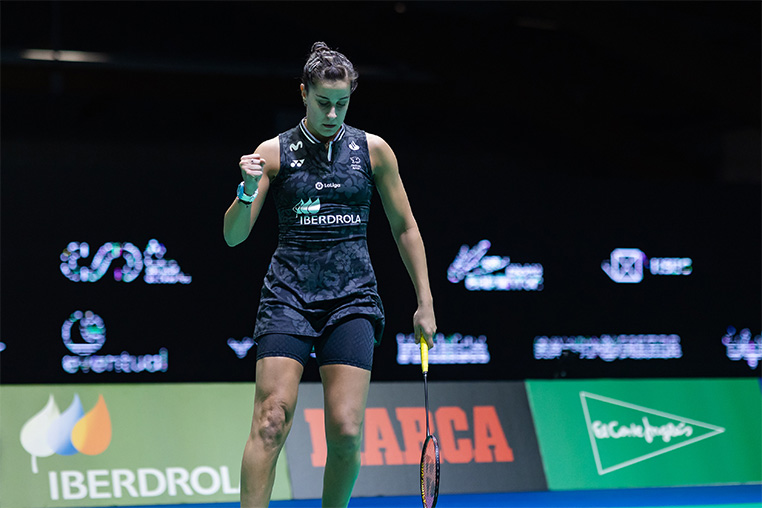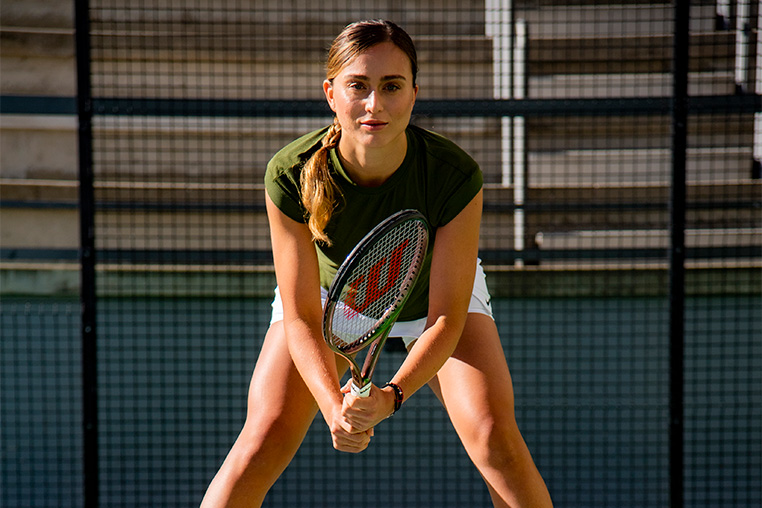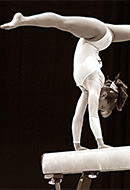High-performance athletes
Champions of sports: normal people or extraordinary beings?
Only a few athletes can become champions, and one question constantly hovers over their success: what makes high-performance athletes different from other human beings? Is it a matter of gifted genetics or a profound training effort? There is no clear-cut answer, but researchers point to the importance of neurons.

Alexia Putellas, one of the best football players in the world and Iberdrola’s ambassador.

Carolina Marín, considered the greatest badminton player ever, is an Iberdrola’s ambassador.

Our ambassador Gisela Pulido is one of the leading figures in international kitesurfing.

Mirelle Leite is a young Brazilian long-distance runner and Iberdrola ambassador.

Spanish tennis player Paula Badosa is an Iberdrola ambassador.

Bruna Kajiya is a professional and passionate kitesurfer and Iberdrola ambassador.
For most areas of our lives, four or five seconds mean nothing, but in sport it is a decisive time – the one that gives a podium, the one that separates one runner from another when reaching the finish line or the essential to score in basketball or to score a goal and win the game. At that moment, only some athletes stand out from the rest and are recognized as champions in their category.
But what makes Katie Kedecky the first swimmer to win five World Championships in a row, and Usain Bolt the fastest man on the planet? Why are Alexia Putellas and Aitana Bonmatí considered two of the best football players in the world? What qualities does Novak Djokovic have to be endorsed as one of the best tennis players of all times?
When an athlete stands out from others, we usually say that he or she has talent, qualities or privileged genetics. But in reality, we do not know what makes the difference. Are the great champions normal people who are transformed by sport or extraordinary people?
Genetics of elite sportsmen and women
Historically, it was thought that there was an ideal body type for any type of exercise and a standard prototype was established for choosing professional athletes. However, at the beginning of the 20th century it began to be seen that some physiologies or physical or biological characteristics were more suitable for some sports than others. For instance, a speed athletics test requires different qualities than a shot put test.
In 2003, an international consortium of scientists managed to decipher the sequence of the human genome – which had a major impact on medicine and the understanding of our DNA. From this moment on, sports science began to analyse possible genetic variants that explain the talents or abilities of successful sportsmen and women.
Various studies have identified ATCN3, which produces a protein found almost exclusively in muscle fibres and enables rapid contraction; and its variant or R allele, which enables an explosive muscle response – promoting speed. Research suggests that the angiotensin-converting enzyme (ACE) gene also plays an important role in regulating blood flow.
But to what extent does our DNA determine our ability to excel in sport? This is not clear. As in many other areas of biology, it has not been possible to establish a direct connection between sporting performance and a single gene. Genetics is only one piece of the puzzle, as on its own cannot determine whether a person is an elite athlete. Other factors that also play a key role in success are training, nutrition and psychological qualities.
The profile of champions of sports
The best profile of champions was drawn by Daniel D. Gould – one of the top 100 professionals in sport psychology, together with two of his collaborators. The Journal of Applied Sport Psychology published their study of ten Olympic champions (six men and four women). The findings indicated that elite athletes show the following psychological characteristics:
Source: Daniel D. Gould, Kristen Dieffenbach and Aaron Moffett. Journal of Applied Sport Psychology (2002)
 SEE INFOGRAPHIC: The profile of champions of sports [PDF]
SEE INFOGRAPHIC: The profile of champions of sports [PDF]
A mindset for success
"At the top level, the physical and technical differences are minimal. All athletes train to the max. What changes is how you feel, how you handle your emotions and what happens on the track". Juan Carlos Campillo, mental coach of badminton player and Olympic medal winner Carolina Marín, explained the importance of mental strength in champions in a national Spanish newspaper a few days before the Spanish athlete won the gold medal, a historical achievement.
Since the second half of the 20th century, numerous studies have argued that the psyche is behind the success of sports champions, with mental skills adapted to the requirements of the sport they play. These conditioning factors include personality factors, but also temperamental factors such as self-confidence, concentration and relaxation, among others.
The responsiveness of champions is a key factor in their sporting success. A study conducted in 2014 by researchers at Ondokuz Mayis University in Turkey External link, opens in new window. showed that the reaction time of non-professional athletes was much longer than that of professionals in most disciplines. Moreover, these times were similar among elite athletes, regardless of the sport they play.
External link, opens in new window. showed that the reaction time of non-professional athletes was much longer than that of professionals in most disciplines. Moreover, these times were similar among elite athletes, regardless of the sport they play.
Researchers from the University of Health and Sport Sciences in Wrocław (Poland) provided new characteristics in research External link, opens in new window. published in 2021 in the International Journal of Environmental Research and Public Health. According to these experts, champions are presumably balanced and stress-resistant; they have a greater attention span and do not panic in difficult situations, and have appropriate emotional reactions to stimuli.
External link, opens in new window. published in 2021 in the International Journal of Environmental Research and Public Health. According to these experts, champions are presumably balanced and stress-resistant; they have a greater attention span and do not panic in difficult situations, and have appropriate emotional reactions to stimuli.
Furthermore, another study published in Frontiers in Psychology External link, opens in new window. (2021) added that athletes tend to be confident in their abilities both in the sporting context and in their daily lives; they have emotional intelligence; and a high general motivation to succeed, which allows them to take risks and set increasingly challenging goals.
External link, opens in new window. (2021) added that athletes tend to be confident in their abilities both in the sporting context and in their daily lives; they have emotional intelligence; and a high general motivation to succeed, which allows them to take risks and set increasingly challenging goals.

Women at the Olympic Games
Find out about the history of women in the Olympic Games and key figures.

Famous female athletes in history
Women's interest in sport continues to grow. Find out how!

Pioneering women in other sectors
Many women have broken barriers to shine. Discover some of them!

Women's football
Iberdrola, a worldwide sponsor of women's football.
The importance of psychological training
If one thing is clear, it is that the mental skills and state of mind of elite athletes are fundamental to their performance. Many coaches argue that, although sport is trained with the body, it is won with the mind. This is where sports psychology plays a key role – providing techniques and tools to optimise performance. These are some of its lines of work with athletes:
![]() Stress control
Stress control
Although a certain level of stress is necessary to face important competitions, sports psychology provides tools to prevent it from becoming a discouraging factor.
![]() Development of concentration and attention
Development of concentration and attention
The aim is for the athlete to be able to focus his or her attention on the task at hand, avoiding internal or external stimuli. Furthermore, he/she must adapt to the different demands depending on the situation.
![]() Motivation drive
Motivation drive
The key is to understand motivation as the process of achieving goals with constant improvement.
![]() Support in injury recovery
Support in injury recovery
This discipline of psychology also provides resources so that the sports professional can gradually return to training and competition after suffering injuries.
![]() Improving emotional management
Improving emotional management
It is based on working on emotions; so that it is possible to channel negative feelings and use them to improve results.
![]() Self-confidence and self-awareness
Self-confidence and self-awareness
Elite athletes work to strengthen their self-esteem and know how to react to certain situations or environmental influences as a tool for self-control.
![]() Goal planning
Goal planning
Psychology helps to set realistic and objective goals that do not lead to demotivation.
![]() Encouraging social relationships
Encouraging social relationships
It is essential to establish healthy links between athletes in a team or with the coaching staff.
Leaders in supporting women champions in sports
Supporting and backing sports leaders is essential to achieve success. For this reason, at Iberdrola we especially support women's sports and back the work of elite professionals to promote their empowerment, recognise their role as a benchmark in society and make the world aware of how necessary it is for us all to build a society with equal opportunities.
We have high-level ambassadors from Spain and Brazil who represent the values of our Group. Together with them, we continue to pave the way for women's sport and their role as champions to receive the recognition they deserve.











